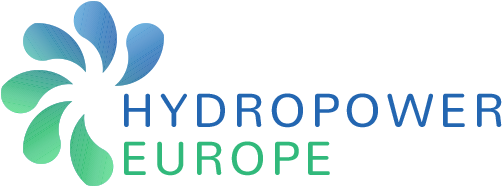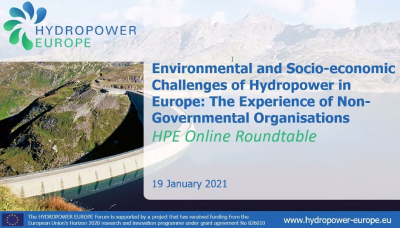Press Clippings
HYDROPOWER EUROPE hosted a roundtable for European NGOs
On the 19th of January 2021, over 20 representatives from non-governmental organisations met together with the HYDROPOWER EUROPE Forum to address the environmental and socio-economic challenges that European countries are facing at an online roundtable.
HYDROPOWER EUROPE organised a roundtable for European NGOs aiming at exchanging experience about hydropower from their respective countries in order to collect useful inputs for the Research and Innovation Agenda and the Strategic Industry Roadmap documents drafted within the project.
Listening to all stakeholders of European hydropower is an essential prerogative of HYDROPOWER EUROPE. In the aftermath of the European Green Deal, the project consortium sees the need of balancing views of all players including NGOs to ensure that hydropower can be used to its full potential while ensuring sustainability and low impact to the communities and ecosystems.
The roundtable was organised by EASE in collaboration with HYDROPOWER EUROPE partners who actively participated in moderating the morning and afternoon sessions. The introduction words were given by the project coordinator and ICOLD – EPFL president, Anton Schleiss, who presented HYDROPOWER EUROPE and its goal to listen to the challenges that NGOs are facing with regards to hydropower.
Session 1 – Geographical regions
Moderated by Jean Jacques Fry, project coordinator, EUCOLD
NGO Pishtaret (Kosovo) – EcoZone (Kosovo) – Coalition Clean Baltic and Polish Academy of Science (Poland and Baltic countries)
Session 2 - Ecosystems
Moderated by Hendrik Multhaupt, VGB PowerTech
Defense des Milieux Aquatiques (France) - Federazione Nazionale Pro Natura (Italy)
Session 3 – Fauna and Biodiversity
Moderated by Andrej Misech, EUREC
Revivo (Slovenia) – Societas Europaea Herpetologica (EU reach) – NABU (EU reach)
Session 4 – Geographical regions
Moderated by Martin Bracken, EASE
CIPRA International (Alpine countries) – Kosovo Foundation for Open Society (Kosovo) – Sustainability Leadership Kosovo (Kosovo) – Balkan Green Foundation (Western Balkans)
Session 5 – Fauna and Biodiversity
Moderated by Anton Schleiss, project coordinator, ICOLD - EPFL
Fisheries Association of the Alps (Alpine countries) – Fishing Association of Slovenia (Slovenia) – Friends of the Earth (Germany)
Session 6 – Environment and Society
Moderated by Diana Prsancova, Zabala Innovation Consulting
EcoKos Women (Kosovo) – EKOEnergy ecolabel (EU reach) – Arnika (Czech Republic)
After each thematic session, participants had the chance to discuss the contents exposed, ask questions and deepen certain topics of interest. The outcomes of presentations and discussions were processed by the HYDROPOWER EUROPE Consortium and they are now available on the Consultation Platform (registration is needed). The Research and Innovation Agenda and the Strategic Industry Roadmap will address the need that future hydropower development takes into account relevant environmental and socio-economic challenges faced by society.
Discussed recommendations
NGOs recommend that the existing hydropower facilities are modernized and their capacity and energy generation expanded while minimizing ecological impacts. The efficiency of existing hydropower projects shall be improved. New water infrastructure should be assessed on relative risks and trade-offs for including alternative energy options and options for increasing energy efficiency.
The representatives from the NGOs suggested that a healthy and thriving river is not possible without a plan to include climate mitigation and adaptation measures that build long-term resilience to climate change in its freshwater ecosystems. Hydropower plants should be developed in suitable locations, outside national parks and reserves and where environmental impact is minimal. There is an importance for fully functional fish migration structures associated with all hydropower plants.
Latest News
EVENT: Developments and biodiversity of watercourses. 8-10 November 2022
"Aménagements et biodiversité des cours d’eau" (EN: "Developments and Biodiversity of watercourses") is a conference organised by the Societé Hydrotechnique de France (SHF), next 8-10 November 2022 in Strasbourg, France. About the confere...
CONFERENCE: "QUO VADIS? Innovation potential of Hydropower" 27 - 28 October 2022
"QUO VADIS? Innovationspotential der Wasserkraft" (Innovation potential of Hydropower) is a conference organised by IBI- Kompetenz, the multidisciplinary platform for e...
JOINT LETTER: Renewables displace fossil fuels - the Innovation Fund must recorgnise this
Joint letter signed by: Bioenergy Europe, the European Heat Pump Assocition (EHPA), the European Renewable Energies Federation (EREF), the European Solar manufacturing Council (ESMC), the European Solar Thermal Electricity Association (ESTELA), Solar Heat Europe (ESTIF), Solar Power Europe, the A...
ETIP HYDROPOWER EUROPE: The permanent and common voice of Hydropower in Europe
ETIP Hydropower Europe (ETIP Hydropower) is a new project in the EU programme ...
Prof. Anton Schleiss at the 7th IAHR Europe Congress (Greece)
Prof. Anton Schleiss, from the International Commission on Large Dams (ICOLD - CIGB), was invited as a keynote speaker for the opening session og the ...
Hydro Power Industry Guide 2021/22 by VGBE
After the success from "Hydro Power Industry guide 2020/21", our colleagues from VGBe wanted to offer us the new guide from this year: “Hydropower Industry Guide 2021/22”. vgbe´s ...
POSITION PAPER: Hydropower as a catalyst and facilitator for the clean, safe and independent energy transition in Europe.
Key Messages: Given Europe’s ambition to raise the renewables target to 45%1 hydropower is critical to ensure Europe’s energy system has the necessary renewable electricity and flexibility to protect grid stability from intermittent renewable energy, to sustain the gr...
NEW PUBLICATION, Hydroscience Journal: "Hydropower, a catalyst for energy transition in Europe"
On the context of HydroES 2021 (22 September 2021), Hydropower Europe had the chance to present its vision and results achieved during three years of consultations. Some of the conclusions are: Hydropower still has a great potential for development Hydropower sector needs...
HYDRO 2022 Strasbourg: How to promote future hydro development in Europe with a sustainable impact?
The HYDROPOWER EUROPE project (2018-2022), funded from the European Union's Horizon 2020 research and innovation program, has released its final deliverables: a Research and Innovation Agenda (RIA) and a Strategic Industry Roadmap (SIR) for the hydropower sector. The challenge is...
Webinar 28 february 2022: What Research and Innovation are Needed to Tap More Hidden Hydro Opportunities in the Future?
The IEA Technology Cooperation Programme (TCP) on Hydropower (also known as IEA Hydro) is a working group of the International Energy Agency's member countries and others that have a common interest in advancing hydropower worldwide. Under the work programme Annex XVI...





